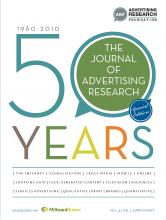Click on the PDF link for the complete article.
ABSTRACT
The Journal of Advertising Research has been instrumental in supporting new ideas about how advertising works, no matter how unpopular their implications. In 1971, Herb Krugman presented evidence that television watching was low involvement compared to print. Three years later, Andrew Ehrenberg postulated that repetition—not persuasion—was how advertising influenced most people. Received wisdom, however, still holds that television advertising works persuasively and works best at high attention levels. This article critically examines this assumption, concluding that the continued success of television advertising in building strong brands most likely will depend not on its ability to persuade but on how well it is able to influence emotions at low levels of attention.
- Copyright© 2011 ARF. All rights reserved.
ARF MEMBERS
If you are a member of the Advertising Research Foundation, you can access the content by logging in here
Log In
Pay Per Article - You may access this article (from the computer you are currently using) for 30 days for US$20.00
Regain Access - You can regain access to a recent Pay per Article purchase if your access period has not yet expired.





